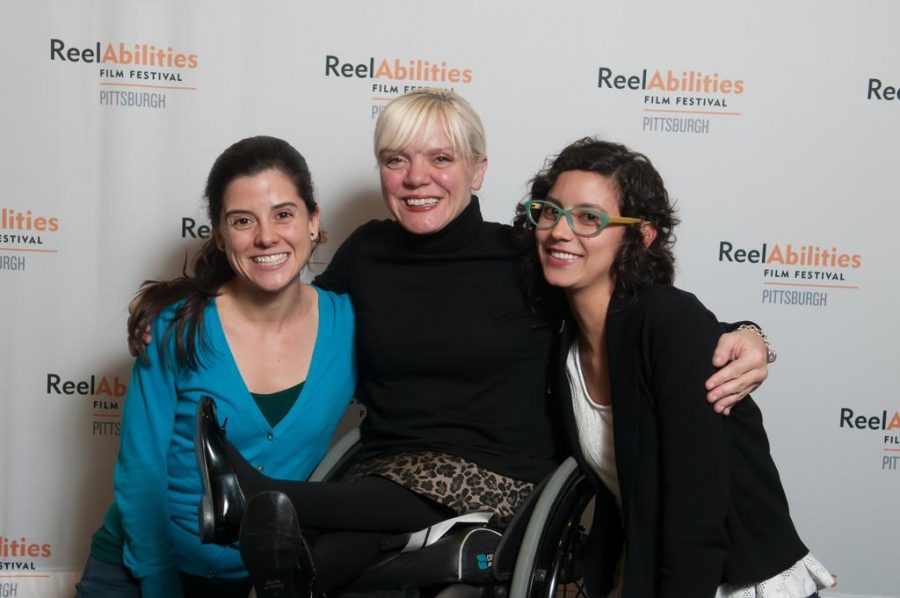Thursday night, Dan McCoy will explain how he became a Paralympic gold medalist before graduating college.
McCoy, a junior communications major, earned his spot on the U.S. men’s Paralympic sled hockey team when he was 16 — he’ll speak at ReelAbilities, a national film festival focused on raising awareness about disabilities. The festival began in Shadyside on Thursday, Oct. 22, and closes Thursday, Oct. 29. The festival is national, but this was Pittsburgh’s third annual ReelAbilities. JFilm, a Jewish-based film organization, hosted the festival at Rodef Shalom Congregation, a venue that’s completely accessible to handicapped guests. The festival features five films and documentaries, and audiences are welcome to sit in on a discussion with McCoy after tonight’s film, “The Finishers.”
As part of the men’s Paralympic sled hockey team, McCoy brought home a gold medal at the 2014 Winter Paralympics in Sochi, Russia. McCoy embodies the resiliency ReelAbilities aims to highlight in its films.
“People look at other individuals with disabilities and see them as fragile, maybe weaker than the average able bodied individual,” McCoy said. “The festival itself reinforces the fact that that’s not really the case.”
JFilm presents international and independent films, which are not always associated with religion.
“We feel that [ReelAbilities] falls within our mission, despite the fact that the films might not be necessarily Jewish in nature,” Kathryn Spitz Cohan, executive director of JFilm, said.
ReelAbilities was established at the Jewish Community Center in Manhattan, New York, in 2007, and now more than a dozen cities across the country hold the event every year.
The festival educates guests about disability, but also accommodates a considerable number of disabled guests. ReelAbilities incorporates subtitles under their films, brings in sign language interpreters and provides headsets for the visually impaired that describe to listeners what’s happening onscreen.
“The goal is to celebrate those with differences and spread the dialogue around disability awareness to a larger audience,” Candace Opper, a spokesperson from JFilm, said.
Cohan knew of Manhattan’s success and was interested in bringing the festival to Pittsburgh. The FISA Foundation, an organization that provides grants to nonprofits for the betterment of women, children and the disabled, shared her interest. Representatives from the foundation contacted Cohan in 2011 and proposed they join forces to bring ReelAbilities to Pittsburgh.
“When the FISA Foundation — an organization that is at the heart of the disability community — approached me, I felt that it would be a perfect match,” Cohan said.
While the Manhattan festival may show nearly 20 films, Pittsburgh’s only shows five. According to Cohan, JFilm selects each year’s films based on specific content and genre.
“[We try] to put together complementary subjects, so it’s not all about one thing,” Cohan said.
ReelAbilities at Rodef Shalom kicked off with “On Beauty,” a documentary that follows fashion photographer Rick Guidotti as he questions conventional definitions of beauty. A reception for guests followed the film, as well as a discussion with Guidotti himself.
Rodef Shalom displayed two photography installations over the week of ReelAbilities. Photographers Rick Guidotti and Pittsburgh’s Martha Rial featured disabled people in a positive way, aligning with the festival’s theme.
“The Case of the Three Sided Dream,” a documentary about blind jazz musician Rahsaan Roland Kirk, screened on Saturday. Remembered for playing multiple woodwind instruments at once, Kirk reached the height of his career in the early 1970s. He made music in a frantic, persistent style, and musicians that played with him during his career attributed that style to his desire to be understood.
Kirk died of a stroke in 1977 at age 42.
Rodef Shalom’s Levy Hall was nearly full when Cohan stepped onstage to introduce the film.
“Just by a show of hands, who’s here [at ReelAbilities] for the first time?” Cohan asked the audience. Nearly two-thirds of the room raised their hands.
“I have goosebumps now,” she said.
Unlike most independent film festivals, ReelAbilities’ content may not interest many people, because they don’t think they can relate to the films’ themes, according to Cohan.
“People hear ‘disabilities,’ and if they themselves don’t have one, or don’t know someone with one, then they’re like to say, ‘Oh, well, this isn’t for me,’” Cohan said. “That’s the challenge: to attract independent cinema lovers. The films are all quality films by quality filmmakers that would most likely never be seen here except for ReelAbilities.”
The RH Factor Band performed after “The Three Sided Dream,” featuring Pittsburgh jazz drummer Roger Humphries, who met Kirk in high school.
Monday’s and Wednesday’s films, “Mimi and Dona” and “Gabriel,” covered intellectual disability and mental illness. Both of the films’ directors spoke after the screenings.
Thursday’s finale, “The Finishers,” is a French film that tells the tale of a young man with cerebral palsy and his father who compete in a triathlon together. McCoy and his father, Mark McCoy, will speak after the film.
Dan McCoy was born with spina bifida and hydrocephalus. His vertebrae didn’t develop correctly and there was an accumulation of fluid in his brain at birth. He has partial paralysis in his knees and lower legs and can only walk short distances. Despite his disability, he became a successful athlete.
McCoy hopes to see ReelAbilities encourage other disabled people to push their limits and abilities further than they would have thought possible.
“People with disabilities have just as much strength, willpower and determination as those with able bodies,” he said.


